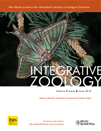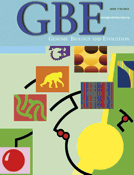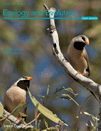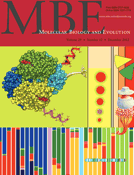
Evolutionary Biology
Scope & Guideline
Unraveling the Mysteries of Life's Evolution
Introduction
Aims and Scopes
- Evolutionary Mechanisms and Dynamics:
The journal emphasizes the study of evolutionary mechanisms, including natural selection, genetic drift, and gene flow, exploring how these factors shape biodiversity and species interactions. - Morphological and Functional Evolution:
There is a strong focus on morphological traits and their evolutionary significance, often utilizing geometric morphometrics to analyze shape and size variations among species. - Population Genetics and Speciation:
Research often investigates genetic diversity within and between populations, contributing to the understanding of speciation processes and the maintenance of species boundaries. - Ecological and Environmental Influences on Evolution:
The journal explores how ecological factors and environmental changes influence evolutionary trajectories, including adaptations to urban environments and climate change. - Phylogenetic and Comparative Analyses:
The use of phylogenetic frameworks to examine evolutionary relationships and comparative methods to assess trait evolution across taxa is a notable aspect of the journal's scope.
Trending and Emerging
- Urban Evolution and Adaptation:
There is an increasing focus on how urban environments influence evolutionary processes, including phenotypic changes and adaptations in wildlife, as urbanization becomes a critical area of study. - Genomic and Molecular Approaches:
Recent research trends indicate a rise in the application of genomic techniques and molecular biology to understand evolutionary dynamics, highlighting the importance of genetic data in evolutionary studies. - Climate Change and Evolutionary Responses:
The impact of climate change on evolutionary processes is gaining traction, with studies exploring how species adapt to changing environments, emphasizing the relevance of evolutionary biology in conservation. - Integration of Evolutionary and Ecological Perspectives:
A notable trend is the integration of evolutionary biology with ecological dynamics, leading to a better understanding of how evolutionary processes interact with ecological factors in shaping biodiversity. - Interdisciplinary Approaches:
The journal is seeing an increase in interdisciplinary research that combines evolutionary biology with fields such as behavioral ecology, conservation biology, and environmental science, reflecting a holistic view of evolutionary challenges.
Declining or Waning
- Historical and Paleontological Studies:
There appears to be a waning interest in historical and paleontological perspectives in evolutionary biology, as more recent publications have shifted towards contemporary ecological and genetic studies. - Traditional Morphometric Methods:
Although geometric morphometrics remains prominent, traditional morphometric approaches seem to be receiving less attention, possibly due to the rise of more advanced analytical techniques. - Broad Taxonomic Studies:
Research that covers a broad range of taxa without a specific focus has decreased, with a growing trend towards detailed studies of specific species or groups, particularly in response to ecological pressures.
Similar Journals

JOURNAL OF MOLECULAR EVOLUTION
Transforming Perspectives on Molecular EvolutionThe Journal of Molecular Evolution, published by Springer, is a prestigious peer-reviewed journal dedicated to advancing the understanding of molecular evolution through high-quality research and analysis. With an impact factor establishing it as a leading authority in the field, this journal provides a vital platform for scholars focused on the intricate relationships between molecular biology and evolutionary processes. Featuring a Q1 ranking in Ecology, Evolution, Behavior and Systematics, and significant rankings in Genetics and Molecular Biology, the journal has consistently positioned itself at the forefront of academic discourse since its inception in 1971. Notably, the journal boasts an extensive archive that converges from 1971 to 2024, providing a comprehensive resource for current and future research. Although it operates on a subscription model, the high caliber of contributions ensures that it remains an essential reference point for researchers, professionals, and advanced students eager to deepen their understanding of molecular mechanisms and evolutionary dynamics.

Integrative Zoology
Exploring the Depths of Animal BiologyIntegrative Zoology is a distinguished journal published by WILEY, focusing on advancing the field of zoological sciences through the integration of various biological disciplines. With both ISSN 1749-4877 and E-ISSN 1749-4869 identifiers, this journal features research that fosters a deeper understanding of animal biology, ecology, and conservation strategies. As a testament to its impact, Integrative Zoology is recognized within the Q1 category of Animal Science and Zoology in 2023, ranking an impressive #27 out of 490 journals in its field, placing it in the 94th percentile among peers. Published in the United Kingdom, this journal not only serves as a critical platform for novel research but also engages a global audience, inviting submissions that bridge theoretical and practical aspects of zoology. While not entirely open access, the journal remains committed to disseminating high-quality research that contributes substantially to scientific advancements. Through its continuous publication since 2008, Integrative Zoology aims to inspire researchers, educators, and students alike, making it a cornerstone for anyone passionate about the complexities of animal life.

DEVELOPMENT GENES AND EVOLUTION
Bridging Genetics and Development for Evolutionary Insights.DEVELOPMENT GENES AND EVOLUTION is a prominent academic journal published by Springer, dedicated to advancing the fields of developmental biology and genetics. With an ISSN of 0949-944X and an E-ISSN of 1432-041X, this journal plays a crucial role in disseminating high-quality research that explores the genetic underpinnings of developmental processes across various organisms. Located in the United States, the journal has maintained a strong international presence with a significant impact factor, reflecting its importance in the scientific community. It currently holds a Q3 ranking in both developmental biology and genetics, according to the latest 2023 category quartiles, indicating a solid standing among peers. With a convergence of insights from 1996 to 2024, the journal publishes original articles, reviews, and research notes that attract a diverse readership of researchers, professionals, and students. Access options include traditional subscription models and open access, ensuring that vital research is available to a broad audience. By fostering discussions on the evolution of developmental mechanisms, DEVELOPMENT GENES AND EVOLUTION continues to be an essential resource for those interested in understanding the intricate interplay between genetics and development.

Genome Biology and Evolution
Fostering Collaboration in Evolutionary ScienceGenome Biology and Evolution, published by Oxford University Press, is a leading open-access journal that has been instrumental in advancing research in the fields of genetics and evolutionary biology since its inception in 2009. With an impressive Q1 ranking in both Ecology, Evolution, Behavior and Systematics and Genetics in 2023, the journal is recognized for its high-quality publications that contribute significantly to the understanding of genomic processes across diverse organisms. As part of its commitment to disseminating impactful research, it is dedicated to fostering interdisciplinary collaboration among scientists and providing a platform for innovative findings. Researchers, professionals, and students alike are encouraged to explore the wealth of knowledge within its pages, contributing to ongoing discussions that shape our understanding of evolutionary mechanisms and genomic data interpretation. With its robust access options and a strong commitment to wide dissemination of research, Genome Biology and Evolution remains an essential resource for anyone engaged in the life sciences.

Evolution Letters
Connecting scholars to the latest in evolutionary studies.Evolution Letters is a premier Open Access journal published by Oxford University Press, dedicated to advancing research in the interdisciplinary fields of Ecology, Evolution, and Genetics. Since its launch in 2017, this journal has rapidly established itself as a leading platform for high-quality research and innovative studies, as reflected by its impressive Q1 quartile rankings in both Ecology, Evolution, Behavior and Systematics and Genetics for 2023. With a remarkable Scopus ranking placing it in the top 3% in its categories, Evolution Letters serves as a vital resource for scholars and practitioners seeking to understand the complexities of evolutionary processes and genetic developments. The journal’s commitment to Open Access ensures that groundbreaking research is freely available to the global scientific community, fostering collaboration, discovery, and progress in these critical fields of study.

Ecology and Evolution
Unlocking the secrets of nature's intricate web.Ecology and Evolution is a leading open-access journal published by WILEY, dedicated to advancing knowledge in the fields of ecology, evolution, and behavior. Since its inception in 2011, the journal has established itself as a critical platform, garnering a significant impact factor and maintaining a prestigious Q1 ranking in multiple categories, including Ecology, Evolution, Behavior and Systematics, and Nature and Landscape Conservation as of 2023. With its continuous commitment to high-quality research, Ecology and Evolution provides a vital conduit for dissemination among researchers, professionals, and students alike. The journal's open-access model ensures that groundbreaking findings are accessible to a global audience, fostering collaboration and innovation across various ecological and evolutionary disciplines. The editorial team invites submissions that explore the intricate relationships between organisms and their environments, aiming to inspire future research that addresses pressing environmental challenges. The journal's rigorous peer-review process guarantees the integrity and quality of published work, reinforcing its position as a frontrunner in its field.

EVOLUTIONARY ECOLOGY
Connecting Evolutionary Theory with Ecological PracticeEVOLUTIONARY ECOLOGY is a prestigious academic journal published by SPRINGER, exploring the intricate relationships between evolutionary processes and ecological dynamics since its inception in 1987. As a key resource in the field of Ecology, Evolution, Behavior, and Systematics, the journal is recognized for its impactful contributions, holding a commendable Q2 quartile ranking in its category as of 2023. With an emphasis on empirical and theoretical studies that bridge evolutionary biology with ecological principles, EVOLUTIONARY ECOLOGY is essential for researchers, practitioners, and students aiming to deepen their understanding of biodiversity, adaptation, and ecosystem functioning. Although it currently does not offer open access, the journal maintains a commitment to disseminating high-quality research that influences both foundational knowledge and practical applications in the field. Located in the Netherlands, the journal continues to serve a global audience, making significant contributions to advancing ecological and evolutionary research through rigorous scientific discourse and innovation.

GENETICA
Fostering Innovation in Genetic Science Since 1919GENETICA is a prominent journal published by SPRINGER, dedicated to advancing the field of genetics and its applications across various biological disciplines, including animal science, plant science, and insect science. Since its inception in 1919, the journal has consistently served as a vital platform for researchers and professionals to disseminate high-quality research findings that explore the genetic bases of biological phenomena. With its current scope spanning from 1943 to 2024, GENETICA holds a commendable position in the academic community, as evidenced by its Q2 ranking in both animal science and insect science, and its active contribution to interdisciplinary studies in genetics. Although the journal does not offer open access, it remains accessible through institutional subscriptions and libraries, ensuring its vital research is widely circulated. Researchers, professionals, and students alike will find GENETICA an invaluable resource for the latest discoveries and methodologies in the ever-evolving landscape of genetics.

ZHURNAL OBSHCHEI BIOLOGII
Unveiling the Mysteries of Life Since 1945ZHURNAL OBSHCHEI BIOLOGII, published by MEZHDUNARODNAYA KNIGA in the Russian Federation, is a venerable journal with a rich history originating in 1945. Renowned for its contributions to the fields of Ecology, Evolution, Behavior, and Systematics, as well as Medicine (miscellaneous), this journal provides a platform for researchers and professionals to disseminate significant findings within these domains. Although currently not classified as an open access publication, ZHURNAL OBSHCHEI BIOLOGII holds a Q4 quartile designation in its respective categories, reflecting its unique positioning within the global research landscape. While its coverage in Scopus is limited, the journal remains an important resource for academics interested in the evolution of biological sciences, especially within the context of Russian research traditions. By fostering scholarly communication and collaboration, ZHURNAL OBSHCHEI BIOLOGII continues to play a critical role in advancing knowledge in the biological sciences.

MOLECULAR BIOLOGY AND EVOLUTION
Exploring the Frontiers of Life's ComplexityMOLECULAR BIOLOGY AND EVOLUTION, published by Oxford University Press, stands as a premier journal in the fields of molecular biology, evolutionary biology, and genetics. With a proud history dating back to its inception in 1983, the journal spans a convergence period through 2024, providing an exceptional platform for disseminating high-quality research. The journal is recognized in the top Q1 quartile across multiple categories, including Ecology, Evolution, Behavior and Systematics, and Genetics, reflecting its significant impact and relevance in these disciplines. With impressive Scopus rankings—10th in Ecology and Evolution, 12th in Genetics, and 22nd in Molecular Biology—it serves as a vital resource for scholars aiming to stay informed on cutting-edge developments in evolutionary processes and molecular genetics. While it currently does not offer open access, its curated contents resonate well with an audience of researchers, professionals, and students deeply interested in accelerating their understanding of the complexities of life through an evolutionary lens.